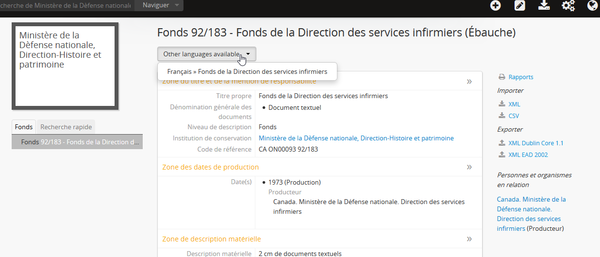Difference between revisions of "Development/Multilingual/2.x development"
(Add basic page content) |
m (fix HR) |
||
| Line 34: | Line 34: | ||
| − | --- | + | ----- |
* [[Development/Multilingual|Back to the Multilingual development page]] | * [[Development/Multilingual|Back to the Multilingual development page]] | ||
Latest revision as of 17:49, 6 July 2015
Main Page > Development > Development/Multilingual > Development/Multilingual/2.x development
This page will capture a brief summary of multilingual and internationalization (i18n) developments added to AtoM since the 2.0.0 release. If a section has not been added for a major release, it is likely because there were no related bug fixes or enhancements for that release.
2.1 Release fixes and enhancements
#7122 - Add language drop-down on descriptions where translated content is available
With this enhancement, users will have a visual cue on descriptions where translated content is available. At the top of a description with translations available, a drop-down menu with a globe icon and the text "Other languages available" now appears. Users can click on this drop-down, and see a list of available translations. Clicking on a translation will flip the AtoM user interface to the chosen language, displaying any translated content in that language as well. Where not all the content of a description has been translated, AtoM will use culture fallback to display the remaining strings in the original source language.
#7120 - Alter language facet to count unique documents regardless of culture
This enhancement was added to account for challenges in how Elasticsearch, AtoM's search index, handles the indexing of multiple translated versions of the same documents. The intent was to make it easier to separate original content from translations available, using the facets available on search and browse pages.
With this change, the default setting in the Language facet, tentatively titled "Unique records," functions as a sort of "All" option - excluding translations. That is, the default facet displays all original content. To see all available content, regardless of whether it is a translation or the original content, the user can then select a specific language facet. For example, if a user selects the English facet, and there is a translation available of a born-Spanish document (i.e. a description originally created in Spanish, but with an English translation added), the translation will be counted in the English facet. Because of this, the sum of all language-specific facets may be greater than the total count for the "Unique records" facet. This is part of why we have no called it an "All" facet (though the facet label may be updated in future versions for greater usability).
See the issue ticket for #7120 for further details.
2.2 Release fixes and enhancements
Release 2.2 includes several smaller bug fixes, such as:
- #7825 - Fix culture fallback in archival description browse
- #8063 - Fix report page breaking when user interface culture is different from default installation culture
- #8250 - Fix
get_search_i18nculture fallback function


